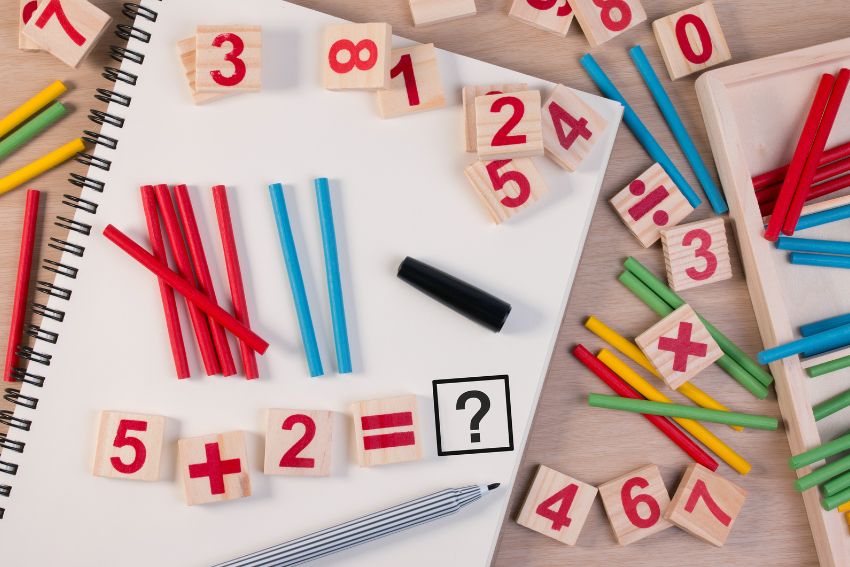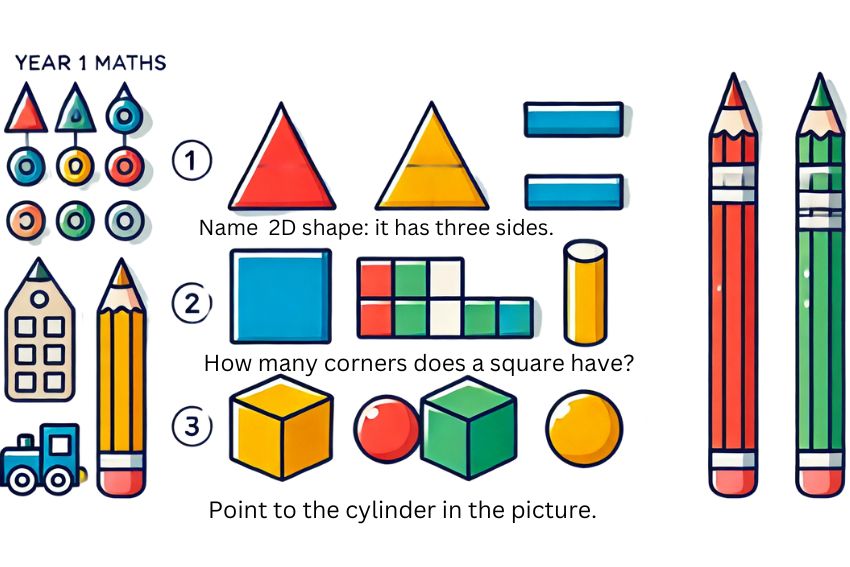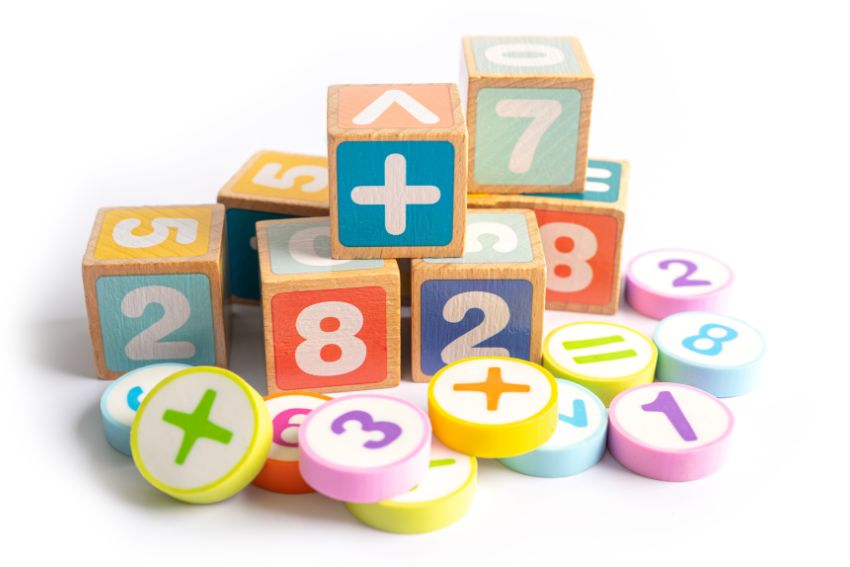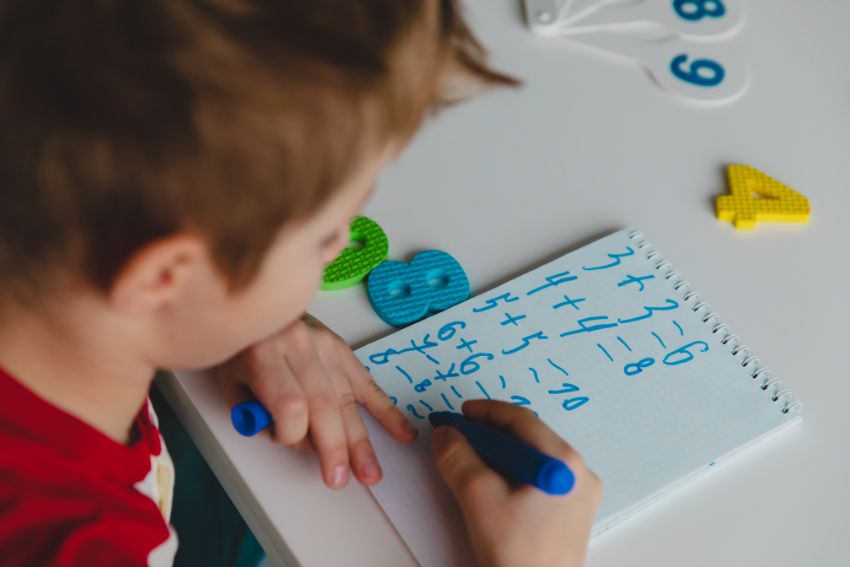Year 1 Maths: Simplified Curriculum and Key Expectations
Year 1 Maths is a key step in a child’s education, introducing essential skills like counting, simple calculations, and understanding shapes. These early lessons, moreover, form the foundation for future maths learning while helping children build confidence in problem-solving.
Moreover, the Year 1 Maths curriculum focuses on making maths both fun and easy to understand. By starting with simple concepts, children can learn at their own pace and enjoy the process. As a result, with the right resources, they can further explore these topics in an engaging and meaningful way, setting the stage for long-term success.

Key Skills Developed in Year 1 Maths
As children progress, the foundation introduced in maths for Year 1 becomes clearer, and they begin developing essential skills to prepare for more advanced concepts. Indeed, the national curriculum for Year 1 maths focuses on a variety of areas, ensuring a well-rounded understanding.
Counting and number recognition
They are key starting points in Year 1 Maths. First, children learn to count forwards and backwards up to 100 while also recognizing and writing numbers with confidence. Then, basic addition and subtraction come into focus. Solving simple calculations within 20 helps them understand basic operations and develop problem-solving skills.
Measurement
Next, during the lessons on measurement, children are introduced to key concepts like length, weight, capacity, and time. Children learn to compare objects by size, measure how heavy or light something is, and understand how much an object can hold. They also begin to tell the time using clocks.
These measurement activities, like measuring ingredients for cooking, comparing the weight of their toys, or understanding the time for daily routines, help children connect maths to real-life situations. This makes maths more relatable and useful in their everyday lives.
Geometric shapes
Finally, learning about shapes is an important part of Year 1 Maths. Identifying common 2D and 3D shapes helps children develop spatial awareness and visual reasoning. Children start by recognizing common 2D shapes, like circles, squares, and triangles, as well as 3D shapes, like cubes, spheres, and cones. They also learn to describe shapes by their sides, corners, or edges.
Practice Year 1 Maths with These Sample Questions
Actually, practicing maths questions for Year 1 is a great way to reinforce what children learn in class. These questions often focus on key skills like counting, addition, subtraction, and recognizing shapes. For example, children might be asked to count objects, solve simple word problems, or identify 2D and 3D shapes. Engaging questions like “How many apples are there?” or “What shape has three sides?” make learning fun and interactive.
Year 1 Maths: Counting and Number Recognition
- How many stars are in the picture?
- Write the numbers from 1 to 20.
- What number comes after 47?
Year 1 Maths: Addition and Subtraction
- If you have 3 apples and get 2 more, how many do you have in total?
- 8 – 5 = ?
- Add 10 + 4.
Year 1 Maths: Place Value
- Circle the number that has 2 tens and 3 ones.
- Which number is bigger: 14 or 41?
Year 1 Maths: Measurement
- Which is longer: your pencil or your ruler?
- What time does the clock show?
Year 1 Maths: Recognizing Shapes
- Name this 2D shape: it has three sides.
- How many corners does a square have?
- Point to the cylinder in the picture.

Effective Teaching Strategies for Year 1 Maths
As we already understand, teaching Year 1 Maths effectively means using creative strategies to keep children engaged and excited about learning. One great way to make maths fun is by using hands-on activities and games. For example, building blocks can help teach counting, and number-based board games can turn lessons into fun adventures.
Additionally, visual aids like number lines, counters, or shape tiles. Those tools help children grasp tricky concepts easily. They allow kids to get abstract ideas. Pairing these resources with Year 1 Maths worksheets reinforces their understanding and builds confidence.
Furthermore, talking about maths is a great strategy. Asking children to explain how they solved a problem improves their understanding and problem-solving skills. Therefore, with the right mix of activities and support, Year 1 Maths can be both enjoyable and effective.
Year 1 Maths Struggles? Here’s How to Overcome Them
So, if your child finds Year 1 Maths tricky and you’re wondering how to help, you’re in the right place. Let’s discuss some common troubles children face and how to address them effectively.
Number Formation and Recognition
In fact, many children struggle with forming or recognizing numbers correctly. To make this easier, you can use Year 1 Maths worksheets or practice with number tracing activities to make learning more enjoyable and effective.
Basic Calculations
Addition and subtraction can feel tricky for some kids. To make it easier, break them into small steps and use real-life examples, like counting apples or toys, to help them understand.Supplement this with Year 1 Maths worksheets PDF resources for extra practice.
Concentration and Engagement
Surely, keeping a young learner focused can be difficult. However, short activities and regular breaks can really help. Also, games that match the Year 1 Maths curriculum, like number matching or puzzles, make learning fun and enjoyable.
Remember, every child learns at their own speed. With the right tools and support, they’ll grow more confident in Maths for Year 1.

Interactive Learning for Year 1 Maths: Games, Worksheets, and More
Supporting your child’s journey in Year 1 Maths is easier with the right tools and activities. Using engaging resources tailored to the national curriculum for Year 1 Maths can make learning both effective and fun.
Online Platforms: Such as Monster Math, MathsFrame and Mathsisfun provide games and challenges designed specifically for young maths learners. By making learning fun, these resources help children practice addition, subtraction, and shapes at their own pace.
Maths Games: Games are a fantastic way to make maths interactive. From number-matching games to puzzles, platforms like Topmarks and BBC Bitesize offer a variety of options that align with the curriculum.
Books and Toys: Picture books about numbers and shapes, along with toys like counting beads and shape sorters, make maths fun and hands-on for young learners.
Thus, with the right support, your child can enjoy learning while improving maths skills. Have you tried any of these resources before?

Monitoring Progress in Year 1 Maths: Tips for Parents
As your child progresses in Maths, understanding how their skills are assessed can help you support them. Teachers use simple methods like watching activities, checking tasks, and reviewing how well children understand the topics. These assessments help keep your child on track with the Year 1 Maths curriculum.
At home, you can keep an eye on their progress by using Maths worksheets. These worksheets are great for spotting areas they’re doing well in and those that need more practice. Printable Year 1 Maths worksheets PDFs also make it easy to practice regularly and see how much they improve over time.
You can also encourage your child to talk about what they’ve learned. Simple questions like, “How did you solve that?” can help you understand their thinking. With both school assessments and support at home, your child will grow more confident in maths. So, how do you track your child’s progress?
Conclusion
To sum up, Year 1 Maths is a key step in your child’s learning journey. It helps them build confidence and important skills for their education. Early lessons, like counting, learning shapes, and solving problems, build the foundation for a bright and successful future.
In fact, as a parent or teacher, you play a crucial role in your child’s learning. By creating a positive and fun environment, you can help them set achievable goals and see maths as an exciting subject instead of overwhelming. Celebrate their achievements, no matter how small, and always motivate them to keep exploring.
Furthermore, If you feel your child could use a little extra help, Online Maths tutors are a fantastic resource. With their personalized guidance, your child can grow their skills and enjoy the process even more. Don’t wait—help your child enjoy learning maths!
FAQs
What Do Year 1 Maths Students Learn?
Year 1 Maths focuses on foundational skills like counting, addition, subtraction, place value, measurement, and shape recognition. In turn, these skills help children develop problem-solving and reasoning abilities.
What Topics Are Covered in Year 1 Mathematics?
Year 1 Mathematics covers counting, number recognition, basic addition and subtraction, place value, measurement (length, weight, capacity, and time), and recognizing 2D and 3D shapes. In fact, these topics provide a foundation for future learning aligning with the Year 1 Maths curriculum.
How Can I Help My Child with Year 1 Maths at Home?
Parents can support Year 1 Maths learning by using educational games, practicing counting with everyday objects, and exploring online worksheets and activities that align with the curriculum.
Where Can I Find Year 1 Maths Resources?
You can find Year 1 Maths resources on websites like BBC Bitesize and Education.com. These platforms offer worksheets, games, and lesson plans tailored for Year 1 students.
What Are Some Fun Year 1 Maths Activities?
Fun Year 1 Maths activities include counting games, quizzes, creating number bonds with toys, Consequently, by using interactive apps learning becomes more interactive and enjoyable.








